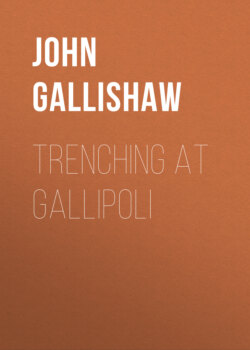Читать книгу Trenching at Gallipoli - John Gallishaw - Страница 6
На сайте Литреса книга снята с продажи.
THERE
ОглавлениеIt was with eleven hundred eager spirits that I lined up on a Sunday evening early in August, 1915, on the deck of a troopship, in Mudros Harbor, which is the center of the historic island of Lemnos, about fifty miles from Gallipoli. Around us lay all sorts of ships, from ocean leviathans to tiny launches and rowboats. There were gray and black-painted troopers, their rails lined with soldiers, immense four-funneled men-o'-war, and brightly lighted, white hospital ships, with their red crosses outlined in electric lights. The landing officer left us in a little motor boat. We watched him glide slowly shoreward, where we could faintly discern through the dusk the white of the tents that were the headquarters for the army at Lemnos. To the right of the tents, we could see the hospital for wounded Australians and New Zealanders. A French battleship dipped its flag as it passed, and our boys sang the Marseillaise.
A mail that had come that day was being sorted. While we waited, each man was served with his "iron ration." This consisted of a one-pound tin of pressed corn beef—the much-hated and much-maligned "bully beef"—a bag of biscuits, and a small tin that held two tubes of "Oxo," with tea and sugar in specially constructed air-and-damp-proof envelopes. This was an emergency ration, to be kept in case of direst need, and to be used only to ward off actual starvation. After that, we were given our ammunition, two hundred and fifty rounds to each man.
But what brought home to me most the seriousness of our venture was the solitary sheet of letter paper with its envelope, that was given to every man, to be used for a parting letter home. For some poor chaps it was indeed the last letter. Then we went over the side, and aboard the destroyer that was to take us to Suvla Bay.
The night had been well chosen for a surprise landing. There was no moon, but after a little while the stars came out. Away on the port bow we could see the dusky outline of land; and once, when we were about half way, an airship soared phantom-like out of the night, poised over us a short time, then ducked out of sight. At first the word ran along the line that it was a hostile airship, but a few inquiries soon reassured us.
Suddenly we changed our direction. We were near Cape Hellas, which is the lowest point of the Peninsula of Gallipoli. Under Sir Ian Hamilton's scheme, it was here that a decoy party was to land to draw the Turks from Anzac. Simultaneously, an overwhelming force was to land at Suvla Bay and at Anzac, to make a surprise attack on the Turks' right flank. Presently, we were going up shore past the wrecked steamer River Clyde, the famous "Ship of Troy," from the side of which the Australians had issued after the ship had been beached; past the shore hitherto nameless, but now known as Anzac. Australian, New Zealand, Army Corps, those five letters stand for; but to those of us who have been on Gallipoli, they stand for a great deal more: they represent the achievement of the impossible. They are a glorious record of sacrifice, reckless devotion, and unselfish courage. To put each letter there cost the men from Australasia ten thousand of their best soldiers.
And so we edged our way along, fearing mines, or, even more disastrous than mines, discovery by the enemy. From the Australasians over at Anzac, we could hear desultory rifle fire. Once we heard the boom of some big guns that seemed almost alongside the ship. Four hours it took us to go fifty miles, in a destroyer that could make thirty-two knots easily. By one o'clock, the stars had disappeared, and for perhaps three quarters of an hour we edged our way through pitch darkness. We gradually slowed down, until we had almost stopped. Something scraped along our side. Somebody said it was a floating mine, but it turned out to be a buoy that had been put there by the navy to mark the channel. Out of the gloom directly in front some one hailed, and our people answered.
"Who have you on board?" we heard the casual English voice say. Then came the reply from our colonel:
"Newfoundlanders."
There was to me something reassuring about that cool, self-contained voice out of the night. It made me feel that we were being expected and looked after.
"Move up those boats," I heard the English voice say, and from right under our bow a naval launch, with a middy in charge, swerved alongside. In a little while it, with its string of boats, was securely fastened.
